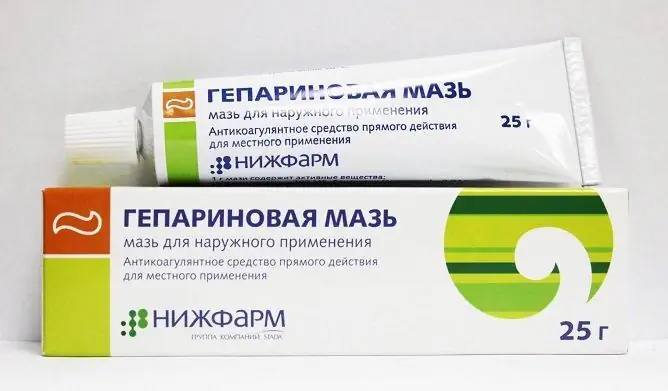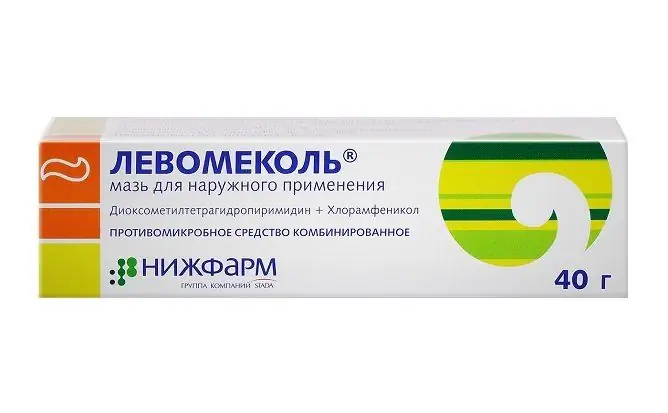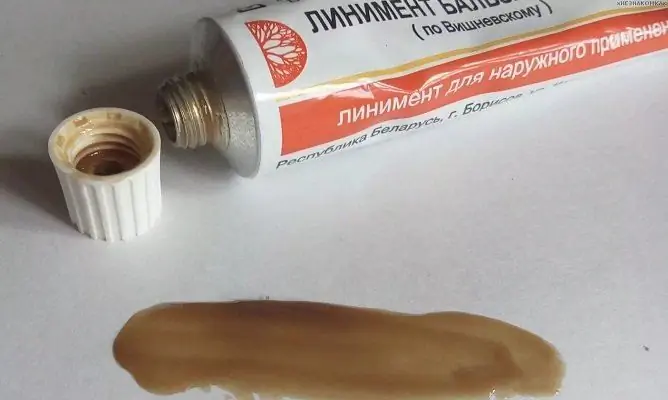- Author Rachel Wainwright wainwright@abchealthonline.com.
- Public 2023-12-15 07:39.
- Last modified 2025-11-02 20:14.
Daivonex
Daivonex: instructions for use and reviews
- 1. Release form and composition
- 2. Pharmacological properties
- 3. Indications for use
- 4. Contraindications
- 5. Method of application and dosage
- 6. Side effects
- 7. Overdose
- 8. Special instructions
- 9. Application during pregnancy and lactation
- 10. Use in childhood
- 11. Drug interactions
- 12. Analogs
- 13. Terms and conditions of storage
- 14. Terms of dispensing from pharmacies
- 15. Reviews
- 16. Price in pharmacies
Latin name: Daivonex
ATX code: D05AX02
Active ingredient: Calcipotriol (Calcipotriol)
Manufacturer: Leo Laboratories Ltd (Denmark)
Description and photo update: 2019-12-08
Prices in pharmacies: from 835 rubles.
Buy

Daivonex is a drug for the treatment of psoriasis with an antiproliferative effect.
Release form and composition
Dosage forms:
- Solution for external use: clear, colorless liquid, slightly viscous structure (60 ml in polyethylene bottles, 1 bottle in a cardboard box);
- Cream for external use: a homogeneous mass of white (30 or 100 g in aluminum tubes, in a cardboard box 1 tube);
- Ointment for external use: from white with a yellow tinge to white, translucent (30 or 100 g in aluminum tubes, in a cardboard box 1 tube).
Active ingredient content:
- 1 ml of solution - calcipotriol monohydrate 52.2 μg, which is equivalent to 50 μg of calcipotriol;
- 1 g of cream - calcipotriol hydrate 52.2 μg, which is equivalent to 50 μg of calcipotriol;
- 1 g of ointment - calcipotriol monohydrate 52.2 μg, which is equivalent to 50 μg of calcipotriol.
Auxiliary components:
- Solution: isopropanol, hyprolose, levomenthol, sodium citrate dihydrate, propylene glycol, purified water;
- Cream: cetostearyl alcohol (cetyl alcohol 60%, stearyl alcohol 40%), macrogol cetostearate, chlorallylmethenamine chloride, disodium edetate dihydrate, glycerol 85%, sodium hydrogen phosphate dihydrate, white soft paraffin (contains about 10 ppm sodium tokidoferol) alpha up to pH 7.5-9), liquid paraffin (contains about 10 ppm alpha-tocopherol), water;
- Ointment: macrogol stearate, alpha-tocopherol, propylene glycol, sodium hydrogen phosphate dihydrate, disodium edetate dihydrate, liquid paraffin, white soft paraffin, water.
Pharmacological properties
Pharmacodynamics
The active substance of Daivonex - calcipotriol - is an analogue of the active metabolite of vitamin D 3. It activates morphological differentiation and inhibits the proliferation of keratinocytes. It is this action that determines the therapeutic effect of Daivonex in psoriasis.
The substance inhibits the activation of T-lymphocytes caused by interleukin 1.
Calcipotriol is 100 times weaker on calcium metabolism than calcitriol.
Pharmacokinetics
Absorption of calcipotriol through the skin is insignificant and amounts to 1-5% of the applied dose. In the liver, calcipotriol is rapidly biotransformed, resulting in the formation of pharmacologically inactive metabolites. The half-life of the drug is very short.
Indications for use
The use of Daivonex is indicated for the treatment of psoriasis vulgaris.
Contraindications
- The period of pregnancy and breastfeeding;
- Hypersensitivity to drug components.
It is recommended to prescribe the solution to children with caution.
The use of cream and ointment is contraindicated in patients with diseases occurring with impaired calcium metabolism.
Age restrictions:
- Cream: up to 18 years old;
- Ointment: up to 6 years.
With caution, Daivonex cream and ointment is used in acute renal and hepatic failure, hypercalcemia, vitamin D hypervitaminosis, hypercalciuria, an indication of a history of nephrolithiasis and in the treatment of patients over 65 years of age.
Instructions for the use of Daivonex: method and dosage
Daivonex preparations are used externally, applying to the skin of the affected areas of the body 2 times a day, the course of treatment is no more than 6-8 weeks. Usually, after 1-2 weeks of use, a clinical effect occurs.
The maximum daily dose of solution, cream or ointment should not exceed 15 g, weekly - 100 g.
If necessary, the frequency of application of the cream or ointment can be reduced to 1 time per day.
In addition, it has been shown that the simultaneous application of the ointment in combination with cyclosporine and acitretin is well tolerated and improves the therapeutic effect. When combined with glucocorticosteroids (GCS), the use of drugs alternates, the ointment is applied in the morning, GCS - in the evening.
The maximum weekly dose of ointment for the treatment of children has age restrictions: from 6 to 12 years old - 50 g, over 12 years old - 75 g.
Side effects
Against the background of the solution, in some cases, transient irritation of the skin is possible, if the dosage regimen is exceeded, hypercalcemia.
Topical cream and topical ointment
- Metabolism: very rarely - hypercalciuria, hypercalcemia;
- Immune system: very rarely - urticaria, allergic reactions, angioedema;
- Dermatological reactions: often - burning sensation, itching, skin irritation, rash (erythematous, scaly, pustular, maculopapular, bullous), dry and peeling skin, erythema; infrequently - exacerbation of symptoms of psoriasis, eczema; very rarely - reversible depigmentation, reversible hyperpigmentation, periorbital edema or facial edema, reversible development of photosensitization.
In addition, the use of cream and ointment can cause contact dermatitis: cream - often, ointment - infrequently.
Overdose
In case of an overdose of Daivonex, an increase in serum calcium concentration (hypercalcemia) is possible, manifested by the following symptoms: thirst, decreased muscle tone, constipation, fatigue, decreased concentration.
With symptoms of hypercalcemia, drug treatment should be discontinued. After discontinuation of Daivonex, the serum calcium concentration is normalized.
special instructions
The application of Daivonex to the face is contraindicated. After each use, hands should be thoroughly washed to avoid accidental contact of the drug with the skin of the face.
Cream and ointment should not be applied to areas of the skin exceeding 30% of the body surface. If patients have severe chronic psoriasis, the use of the drug should be accompanied by careful monitoring of the level of calcium in the urine and blood, since this category of patients increases the intensity of absorption and the risk of hypercalcemia.
The recommended dosage of calcipotriol must not be exceeded. After discontinuation of the drug, the level of calcium concentration in the blood returns to normal quickly.
With the simultaneous use of a solution with a cream or ointment, it is necessary to take into account the total dose of calcipotriol, which should not exceed 0.005 g per week (1 g of Daivonex cream or ointment corresponds to 1 ml of scalp solution).
The cetostearyl alcohol content of the cream may contribute to the appearance of a rash.
During treatment, patients are advised to avoid excessive exposure to direct sunlight. On the recommendation of a doctor, treatment can be combined with exposure to ultraviolet light, PUVA and selective therapy.
The use of the ointment in patients under the age of 18 is recommended only in short courses and on small areas of the skin surface.
According to the instructions, Daivonex does not affect the patient's ability to drive vehicles and mechanisms.
Application during pregnancy and lactation
The drug is not recommended for use in pregnant and lactating women, since the safety of its use during pregnancy and lactation has not been established. It is also unknown whether calcipotriol is secreted in breast milk.
Pediatric use
Daivonex ointment is contraindicated in children under 6 years old, the cream is not used in children and adolescents under 18 years old. Daivonex solution is prescribed with caution in childhood.
Drug interactions
The simultaneous use of calcipotriol with salicylic acid drugs for external use is contraindicated.
Analogs
Daivonex analogs are: Daivobet, Psorkutan, Glenriaz.
Terms and conditions of storage
Store at temperatures up to 25 ° C. Keep out of the reach of children.
Shelf life: solution - 3 years, cream and ointment - 2 years (after opening the tube - 6 months).
Terms of dispensing from pharmacies
Available without a prescription.
Reviews about Daivonex
Reviews about Daivonex are ambiguous. Some patients respond positively to the drug, in particular, they note that it helps quickly and is very effective. After regular use of a cream or ointment, plaques and peeling are almost completely removed. Some reviews talk about the side effects of Daivonex, for example, severe redness of the skin after applying the drug. Another disadvantage is the rather high cost of the product compared to analogues.
Experts and pharmacists speak of Daivonex as a strong and reliable drug for the treatment of psoriasis, including chronic psoriasis, but they do not recommend using the drug without consulting a doctor.
The price of Daivonex in pharmacies
Today, the prices for Daivonex in pharmacies are as follows:
- ointment for external use 50 mcg / g (30 g each in aluminum tubes) - from 997 rubles;
- cream for external use 50 mcg / g (30 g each in aluminum tubes) - from 997 rubles;
- solution for external use 0.005% (50 ml in vials) - from 1160 rubles.
Daivonex: prices in online pharmacies
|
Drug name Price Pharmacy |
|
Daivonex 50 μg / g ointment for external use 30 g 1 pc. RUB 835 Buy |

Maria Kulkes Medical journalist About the author
Education: First Moscow State Medical University named after I. M. Sechenov, specialty "General Medicine".
Information about the drug is generalized, provided for informational purposes only and does not replace the official instructions. Self-medication is hazardous to health!






